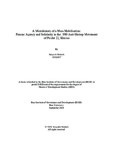| dc.contributor.advisor | Priyadarshini, Aanmona | |
| dc.contributor.author | Mahtab, Moyukh | |
| dc.date.accessioned | 2021-03-14T09:32:27Z | |
| dc.date.available | 2021-03-14T09:32:27Z | |
| dc.date.copyright | 2020 | |
| dc.date.issued | 2020-09 | |
| dc.identifier.other | ID: 18262017 | |
| dc.identifier.uri | http://hdl.handle.net/10361/14346 | |
| dc.description | This thesis is submitted in partial fulfillment of the requirements for the degree of Masters of Development Studies, 2020 | en_US |
| dc.description | Cataloged from PDF version of Thesis. | |
| dc.description | Includes bibliographical references (pages 86-92). | |
| dc.description.abstract | Karunamoyee Sarder was killed in November, 1990 while leading a protest against shrimp
aquaculture in Polder 22 of Paikgacha, Khulna, Bangladesh. Karunamoyee and other landless
protestors were attacked with guns and bombs by goons hired by a local shrimp farm owner.
Following her murder, the continued mobilisation of the peasants of Polder 22 evolved into a
mass movement against shrimp aquaculture. To date Polder 22 has remained a shrimp-free
zone and thousands of peasants continue to gather each year to commemorate her as a martyr.
Using oral and textual sources, this microhistory of the movement highlights the complexities
of peasant agency and solidarity, aspirations and motivations, that constitute their initial act of
resistance. It also demonstrates how wider alliances with political parties and civil society
organisations, within the specific context of 1990s Bangladesh, propelled the local resistance
into a mass movement. Through these, it explores how Karunamoyee and the movement have
today become symbols embodying peasant rights and struggles beyond the immediate context
of the movement for the people of Polder 22. | en_US |
| dc.description.statementofresponsibility | Moyukh Mahtab | |
| dc.format.extent | 93 pages | |
| dc.language.iso | en_US | en_US |
| dc.publisher | Brac University | en_US |
| dc.rights | Brac University theses are protected by copyright. They may be viewed from this source for any purpose, but reproduction or distribution in any format is prohibited without written permission. | |
| dc.subject | Peasant politics and protests | en_US |
| dc.subject | Shrimp aquaculture | en_US |
| dc.subject | Social mobilisation | en_US |
| dc.subject | Microhistory | en_US |
| dc.subject | Peasant agency and solidarity | en_US |
| dc.subject | Coastal Bangladesh | en_US |
| dc.title | A microhistory of a mass mobilisation: Peasant agency and solidarity in the 1990 anti-shrimp movement of polder 22, Khulna | en_US |
| dc.type | Thesis | en_US |
| dc.contributor.department | BRAC Institute of Governance and Development, Brac University | |
| dc.description.degree | M. Development Studies | |

